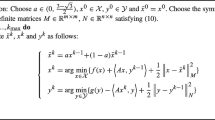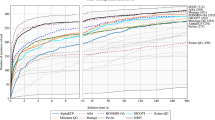Abstract
In this paper, the problem of safe global maximization (it should not be confused with robust optimization) of expensive noisy black-box functions satisfying the Lipschitz condition is considered. The notion “safe” means that the objective function f(x) during optimization should not violate a “safety” threshold, for instance, a certain a priori given value h in a maximization problem. Thus, any new function evaluation (possibly corrupted by noise) must be performed at “safe points” only, namely, at points y for which it is known that the objective function \(f(y) > h\). The main difficulty here consists in the fact that the used optimization algorithm should ensure that the safety constraint will be satisfied at a point y before evaluation of f(y) will be executed. Thus, it is required both to determine the safe region \(\varOmega \) within the search domain D and to find the global maximum within \(\varOmega \). An additional difficulty consists in the fact that these problems should be solved in the presence of the noise. This paper starts with a theoretical study of the problem, and it is shown that even though the objective function f(x) satisfies the Lipschitz condition, traditional Lipschitz minorants and majorants cannot be used due to the presence of the noise. Then, a \(\delta \)-Lipschitz framework and two algorithms using it are proposed to solve the safe global maximization problem. The first method determines the safe area within the search domain, and the second one executes the global maximization over the found safe region. For both methods, a number of theoretical results related to their functioning and convergence is established. Finally, numerical experiments confirming the reliability of the proposed procedures are performed.













Similar content being viewed by others
Notes
Clearly, there can exist several constants \({\tilde{L}}\) such that if they are placed in (1) instead of L the inequality will hold. Without loss of generality we suppose hereinafter that \(L>\min {\tilde{L}}\).
References
Archetti F, Schoen F (1984) A survey on the global optimization problem: general theory and computational approaches. Ann Oper Res 1(2):87–110
Barkalov KA, Gergel VP (2016) Parallel global optimization on GPU. J Glob Optim 66(1):3–20
Barkalov KA, Strongin RG (2018) Solving a set of global optimization problems by the parallel technique with uniform convergence. J Glob Optim 71(1):21–36
Ben-Tal A, El Ghaoui L, Nemirovski A (2009) Robust optimization. Princeton University Press, Princeton
Berkenkamp F, Schoellig AP, Krause A (2016) Safe controller optimization for quadrotors with Gaussian processes. In: 2016 IEEE International Conference on Robotics and Automation (ICRA). IEEE, pp 491–496. https://doi.org/10.1109/icra.2016.7487170
Calvin JM, Žilinskas A (2000) One-dimensional P-algorithm with convergence rate \(\cal{O}(n-3+\delta )\) for smooth functions. J Optim Theory Appl 106(2):297–307
Calvin JM, Žilinskas A (2005) One-dimensional global optimization for observations with noise. Comput Math Appl 50(1–2):157–169
Calvin JM, Chen Y, Žilinskas A (2012) An adaptive univariate global optimization algorithm and its convergence rate for twice continuously differentiable functions. J Optim Theory Appl 155(2):628–636
Casado L, García I, Sergeyev YD (2003) Interval algorithms for finding the minimal root in a set of multiextremal one-dimensional nondifferentiable functions. SIAM J Sci Comput 24(2):359–376
Cavoretto R, De Rossi A, Mukhametzhanov MS, Sergeyev YD (2019) On the search of the shape parameter in radial basis functions using univariate global optimization methods. J Glob Optim. https://doi.org/10.1007/s10898-019-00853-3
Daponte P, Grimaldi D, Molinaro A, Sergeyev YD (1996) Fast detection of the first zero-crossing in a measurement signal set. Measurement 19(1):29–39
Fiducioso M, Curi S, Schumacher B, Gwerder M, Krause A (2019) Safe contextual Bayesian optimization for sustainable room temperature PID control tuning. In: Proceedings of the twenty-eighth international joint conference on artificial intelligence. IJCAI, pp 5850–5856. https://doi.org/10.24963/ijcai.2019/811
Floudas CA, Pardalos PM (1996) State of the art in global optimization. Kluwer Academic Publishers, Dordrecht
García J, Fernández F (2012) Safe exploration of state and action spaces in reinforcement learning. J Artif Intell Res 45:515–564
Gergel VP, Sidorov SV (2015) A two-level parallel global search algorithm for solution of computationally intensive multiextremal optimization problems. In: Malyshkin V (ed) Parallel computing technologies (PaCT 2015), LNCS, vol 9251. Springer, Cham, pp 505–515
Gergel VP, Grishagin VA, Israfilov RA (2015) Local tuning in nested scheme of global optimization. Procedia Comput Sci 51:865–874
Gillard JW, Kvasov DE (2016) Lipschitz optimization methods for fitting a sum of damped sinusoids to a series of observations. Stat Interface 10(1):59–70
Grishagin VA, Israfilov RA, Sergeyev YD (2018) Convergence conditions and numerical comparison of global optimization methods based on dimensionality reduction schemes. Appl Math Comput 318:270–280
Hansen P, Jaumard B, Lu SH (1992) Global optimization of univariate Lipschitz functions: II. New algorithms and computational comparison. Math Program 55(1–3):273–292
Horst R, Pardalos PM (eds) (1995) Handbook of global optimization, vol 1. Kluwer Academic Publishers, Dordrecht
Jones DR, Schonlau M, Welch WJ (1998) Efficient global optimization of expensive black-box functions. J Glob Optim 13(4):455–492
Kvasov DE, Mukhametzhanov MS (2018) Metaheuristic vs. deterministic global optimization algorithms: the univariate case. Appl Math Comput 318:245–259
Kvasov DE, Sergeyev YD (2012) Univariate geometric Lipschitz global optimization algorithms. Numer Algebra Control Optim 2(1):69–90
Kvasov DE, Sergeyev YD (2013) Lipschitz global optimization methods in control problems. Autom Remote Control 74(9):1435–1448
Kvasov DE, Sergeyev YD (2015) Deterministic approaches for solving practical black-box global optimization problems. Adv Eng Softw 80:58–66
Kvasov DE, Mukhametzhanov MS, Nasso MC, Sergeyev YD (2020) On acceleration of derivative-free univariate Lipschitz global optimization methods. In: Sergeyev Y., Kvasov D. (eds) Numerical computations: theory and algorithms. NUMTA 2019. Lecture notes in computer science, vol 11974. Springer, Cham, pp 413–421
Lera D, Sergeyev YD (2010) Lipschitz and Hölder global optimization using space-filling curves. Appl Numer Math 60:115–129
Lera D, Sergeyev YD (2013) Acceleration of univariate global optimization algorithms working with Lipschitz functions and Lipschitz first derivatives. SIAM J Optim 23(1):508–529
Molinaro A, Sergeyev YD (2001a) An efficient algorithm for the zero-crossing detection in digitized measurement signal. Measurement 30(3):187–196
Molinaro A, Sergeyev YD (2001b) Finding the minimal root of an equation with the multiextremal and nondifferentiable left-hand part. Numer Algorithms 28(1–4):255–272
Paulavičius R, Sergeyev YD, Kvasov DE, Žilinskas J (2014) Globally-biased DISIMPL algorithm for expensive global optimization. J Glob Optim 59(2–3):545–567
Paulavičius R, Sergeyev YD, Kvasov DE, Žilinskas J (2020) Globally-biased BIRECT algorithm with local accelerators for expensive global optimization. Expert Syst Appl 144:113052
Pintér JD (1996) Global optimization in action (continuous and Lipschitz optimization: algorithms, implementations and applications). Kluwer Academic Publishers, Dordrecht
Piyavskij SA (1972) An algorithm for finding the absolute extremum of a function. USSR Comput Math Math Phys 12(4):57–67 (In Russian: Zh. Vychisl. Mat. Mat. Fiz., 12(4) (1972), pp 888–896)
Schillinger M, Hartmann B, Skalecki P, Meister M, Nguyen-Tuong D, Nelles O (2017) Safe active learning and safe Bayesian optimization for tuning a PI-controller. IFAC-PapersOnLine 50(1):5967–5972 20th IFAC World Congress
Sergeyev YD (1995) A one-dimensional deterministic global minimization algorithm. Comput Math Math Phys 35(5):553–562
Sergeyev YD, Grishagin VA (2001) Parallel asynchronous global search and the nested optimization scheme. J Comput Anal Appl 3(2):123–145
Sergeyev YD, Kvasov DE (2017) Deterministic global optimization: an introduction to the diagonal approach. Springer, New York
Sergeyev YD, Daponte P, Grimaldi D, Molinaro A (1999) Two methods for solving optimization problems arising in electronic measurements and electrical engineering. SIAM J Optim 10(1):1–21
Sergeyev YD, Famularo D, Pugliese P (2001) Index branch-and-bound algorithm for Lipschitz univariate global optimization with multiextremal constraints. J Glob Optim 21(3):317–341
Sergeyev YD, Strongin RG, Lera D (2013) Introduction to global optimization exploiting space-filling curves. Springer, New York
Sergeyev YD, Mukhametzhanov MS, Kvasov DE, Lera D (2016) Derivative-free local tuning and local improvement techniques embedded in the univariate global optimization. J Optim Theory Appl 171(1):186–208
Sergeyev YD, Kvasov DE, Mukhametzhanov MS (2017) Operational zones for comparing metaheuristic and deterministic one-dimensional global optimization algorithms. Math Comput Simul 141:96–109
Sergeyev YD, Kvasov DE, Mukhametzhanov MS (2018a) On strong homogeneity of a class of global optimization algorithms working with infinite and infinitesimal scales. Commun Nonlinear Sci Numer Simul 59:319–330
Sergeyev YD, Kvasov DE, Mukhametzhanov MS (2018b) On the efficiency of nature-inspired metaheuristics in expensive global optimization with limited budget. Sci Rep 8:1–9
Sergeyev YD, Nasso MC, Mukhametzhanov MS, Kvasov DE (2020) Novel local tuning techniques for speeding up one-dimensional algorithms in expensive global optimization using Lipschitz derivatives. J Comput Appl Math (submitted)
Strongin RG, Sergeyev YD (2000) Global optimization with non-convex constraints: sequential and parallel algorithms. Kluwer Academic Publishers, Dordrecht
Sui Y, Gotovos A, Burdick JW, Krause A (2015) Safe exploration for optimization with Gaussian processes. In: Bach F, Blei D (eds) Proceedings of the 32nd international conference on machine learning, PMLR, vol 37. Lille, France, pp 997–1005
Vanderbei RJ (1999) Extension of Piyavskii’s algorithm to continuous global optimization. J Glob Optim 14(2):205–216
Žilinskas A, Zhigljavsky A (2016) Stochastic global optimization: a review on the occasion of 25 years of Informatica. Informatica 27(2):229–256
Žilinskas A, Žilinskas J (2010) Interval arithmetic based optimization in nonlinear regression. Informatica 21(1):149–158
Author information
Authors and Affiliations
Corresponding author
Ethics declarations
Conflict of interest
The authors declare that they have no conflict of interest.
Ethical approval
This article does not contain any studies with human participants or animals performed by any of the authors.
Additional information
Communicated by Yaroslav D. Sergeyev.
Publisher's Note
Springer Nature remains neutral with regard to jurisdictional claims in published maps and institutional affiliations.
Appendix
Appendix




Rights and permissions
About this article
Cite this article
Sergeyev, Y.D., Candelieri, A., Kvasov, D.E. et al. Safe global optimization of expensive noisy black-box functions in the \(\delta \)-Lipschitz framework. Soft Comput 24, 17715–17735 (2020). https://doi.org/10.1007/s00500-020-05030-3
Published:
Issue Date:
DOI: https://doi.org/10.1007/s00500-020-05030-3




